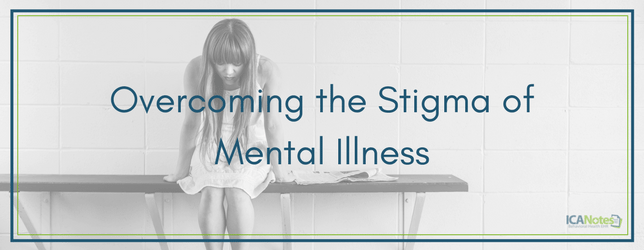Overcoming the Stigma of Mental Illness
Mental Illness in America
More than 43 million Americans are suffering from mental illness, but less than half of those, some 43 percent, receive treatment, according to the recent State of Mental Health report by Mental Health in America. Equally as alarming are the facts about children’s mental health. During the past five years, severe youth depression rates have increased, and teen suicides are at an all-time high. It’s not surprising, then, that the State of Mental Health report found that most depressed kids, 76 percent, don’t get the treatment they need, with heartbreaking results.
For teens, and even younger children, bullying, cyber harassment and family issues can lead to depression and thoughts of suicide. For adults, there’s a study correlating depression, anxiety, negative behaviors and fear to today’s vitriolic political landscape, with Psychology Today even running a story about how to cope with “Trump anxiety.”
By any measure, it’s a national crisis. Access to care and treatment for mental conditions is critical, as are early identification and diagnosis. But that’s only part of the story. Even with the best access to treatment and the insurance to cover the cost, people suffering from depression, anxiety and other mental conditions just don’t seek treatment often enough.
Why? Often it has to do with the stigma associated with mental conditions.
Tips for Overcoming the Stigma of Mental Illness
Stigma can cause people to hide their conditions, not seek treatment, and even engage in harmful behaviors and negative thoughts. They wind up feeling hopeless about the future and their place in it.
How do people with a form of mental illness overcome that stigma? The Mayo Clinic offers these recommendations:
- Seek treatment. This can be the biggest hurdle for people because of the stigma that comes with mental illness, but not only will proper diagnosis and treatment take a weight off a patient’s mind — knowing what you’re dealing with is half the battle — but treatment can reduce or eliminate symptoms and lead to a happier, more productive life.
- Banish self-doubt and shame. Stigma isn’t just about the way the outside world may or may not view someone with a mental illness. It comes from within, too. He or she may believe the condition is a personal failing or weakness, something they’ve done wrong, or something they should be able to control on their own.
- Don’t be isolated. Family, friends, clergy, support groups or others can provide support, understanding and love. Patients with mental illnesses should reach out to people they trust and tell them about their diagnosis and treatment. It’s especially important for them to know they’re not alone. Support from loved ones goes a long way.
- Don’t identify with the illness. Even simple verbiage is important here. Patients are not their illnesses. So they shouldn’t say: “I’m bipolar.” Instead, say: “I have bipolar disorder.”
- Speak out. It not only helps others suffering from similar conditions, but it helps the person speaking out as well. Actress and singer Demi Lovato was diagnosed with bipolar disorder in 2011, and since then has become a vocal advocate for mental health issues, raising awareness, sparking conversations and helping her young fans overcome the stigma that causes people to not seek treatment. She has been quoted as saying that speaking out about her own struggles and helping others with theirs has been a powerful force in her healing.
ICANotes’ specialized EHR software enables psychiatrists to see more patients each day by easing the regulation and documentation burden, allowing them to focus on the reason they got into practice in the first place: to care for their patients’ mental health. To learn more about our electronic health record solutions, please contact us today or request your free trial.

